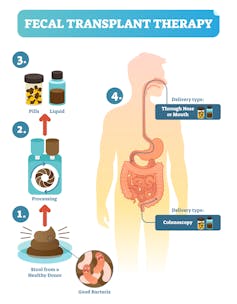Fecal microbiome transplantation shows promise in treating colitis
Cancer immunotherapy is a revolutionary treatment for many but it can cause nasty side effects like inflammation of the colon that can derail treatment. Could the solution be a fecal transplant?

Immunotherapy, the Nobel Prize-winning category of cancer therapy that helps your immune cells to fight tumors, has transformed the field of cancer care by improving the long-term survival in patients with various types of cancer, like melanoma and those affecting the organs in the genital and urinary systems.
One type of immunotherapy called immune checkpoint inhibitors (ICI), releases a brake on the immune system and activates a type of white blood cell to attack cancer cells. But these treatments can cause severe, sometimes life-threatening side effects.
My research team at MD Anderson in Houston, Texas, and I just published a study that shows promise in treating these side effects, and more importantly, possibly in allowing these patients to continue cancer treatment.
Cancer and colitis
One common and serious side effect of ICI treatment is inflammation of the colon, or colitis. It can occur in up to 40 percent of patients. Symptoms include diarrhea, rectal bleeding, abdominal pain, and/or fever. These can cause severe dehydration that may need fluid replacement and blood transfusion, which require hospitalization. When ICI-associated colitis is severe, treatment guidelines recommend that patients stop ICI therapy until the colitis resolves.
This is unfortunate because colitis development indicates that the cancer is responding well to ICI therapy. By stopping ICI, we are taking away an effective treatment. Therefore, we need to find remedies for ICI-associated colitis to quickly cure the condition and get our patients back on their cancer therapy.

Currently, doctors treat these patients with steroids and other agents that suppress the immune function. But these can trigger their own adverse effects and potentially counteract the immunotherapy and drive cancer growth and spread. In addition, some patients develop colitis that fails to respond to all of these treatments.
There may, however, be a way to treat these symptoms and allow patients to continue cancer treatment. It’s called fecal microbiota transplantation (FMT). It involves transplanting gut bacteria from the colon of healthy donors into the colon of patients with colitis. This is done via colonoscopy. This technique has shown promise in treating other types of gastrointestinal disorders, such as recurrent Clostridium difficile infection and inflammatory bowel disease (IBD). In fact, ICI-associated colitis is considered autoimmune in nature and shares many characteristics with IBD-colitis.
Fecal microbiota transplantation
My team and I recently published a study in Nature Medicine showing, for the first time, that FMT successfully treats ICI-associated colitis. In just two weeks, our two patients made a full recovery – diarrhea frequency dropped close to baseline, and bleeding and pain ceased.
It is important to note that this study was not a clinical trial with a large number of patients but rather a compassionate study, for cases that fail the standard therapy. Although the study was limited by small size – just two patients – I believe our results highlighted the possibility of implementing this treatment in a larger population for a clinical trial as a first-line or compassionate therapy for treating patients with ICI-associated colitis. This is a quick treatment with effects that is durable for many months. And, it is safer than steroids and other immunosuppressive treatments traditionally used to treat colitis.
It will take a lot more research to figure out how the microbiome regulates ICI-associated colitis. We will explore this angle so that we can treat or even prevent colitis so that patients can get the full benefit of ICI therapy.
Yinghong Wang does not work for, consult, own shares in or receive funding from any company or organisation that would benefit from this article, and has disclosed no relevant affiliations beyond their academic appointment.
Read These Next
Crowdfunded generosity isn’t taxable – but IRS regulations haven’t kept up with the growth of mutual
Some Americans are discovering that monetary help they received from friends, neighbors or even strangers…
Michelangelo hated painting the Sistine Chapel – and never aspired to be a painter to begin with
A red chalk sketch for the Sistine ceiling fetched an eye-popping sum at auction, reflecting the artist’s…
Why Stephen Colbert is right about the ‘equal time’ rule, despite warnings from the FCC
The ‘equal time’ rule has been around for a century and aims to promote broadcasters’ editorial…






